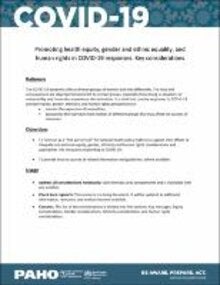Following the emergency, it will be important to carry out interdisciplinary research to reveal inequities and inequalities in COVID-19 preparedness, responses, and impacts in order to plan for dedicated investments to redress the social and economic fallout and prevent them in future public health emergencies.
The COVID-19 pandemic affects diverse groups of women and men differently. The risks and social and economic impacts of COVID-19 are disproportionately felt by those living in situations of vulnerability and those who experience discrimination. It is therefore vital that country responses to COVID-19 consider equity, gender, ethnicity, and human rights perspectives to prevent the expansion of inequalities. The response must account for the everyday realities of different groups that may affect the success of measures.
Discrimination based on ethnicity, gender and gender identity, sexuality, class, geography, and/or disability is a key limiting factor in access to health and to health outcomes in the context of COVID-19. Discrimination can subject people in these groups to a higher risk of infection, limit their access to services, undermine broader COVID-19 responses, and exacerbate the underlying inequities.
This document guides national health policy makers in their efforts to integrate and enhance equity, gender, ethnicity, and human rights considerations and approaches into measures responding to COVID-19. It also complements PAHO’s technical documents on COVID-19 and provides links to sources of related information and guidelines.
|

